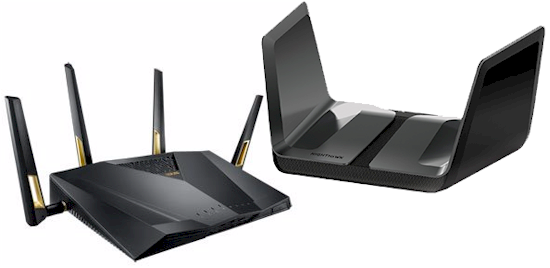
Read on SmallNetBuilder

But try as I might, I could not get the Lenovo to recognize the card, even with it upgraded to Windows 10 and with the latest Intel drivers.
There is no "pick" at this time other than my recommendation to not buy any draft 11ax product right now.Great review. So it seems the R7800 is your pick of the bunch.
I have another request. I saw an information on a German website about the consumption of each router and it might be that they are quite different. Since they have nearly the same hardware, I find that odd.
admin@stargate88ax:/sys# cat devices/system/cpu/bcm_arm_cpuidle/
admin_max_freq enable_auto_clkdiv oper_max_freq percent_inside_clkdiv time_inside_clkdiv time_outside_clkdiv valid_freq_list
admin@stargate88ax:/sys# cat devices/system/cpu/bcm_arm_cpuidle/enable_auto_clkdiv
0
admin@stargate88ax:/sys# cat devices/system/cpu/bcm_arm_cpuidle/valid_freq_list
1800
900
450
225Because I always test with latest publicly available firmware.I noticed "For reference, I also retested NETGEAR's R7800 with v1.0.2.60 firmware" which known as buggy firmware especially Wi-Fi part and ppl talks about this in whole forum, why still using it for the test?
This is very interesting - so the SSD is attached to a USB port and you are seeing 1120Mbps ? Very cool.Great article, just one correction @thiggins ; RAX 80 has 1GB RAM just like the AX88U.
I get a bit better HT160 results on the RAX80 vs the R7800, guess our different test environments account for that. As for the 5Ghz 80Mhz and 2.4 20 Mhz uplink I’m getting significantly higher than that flat line, was similar to the R7800 if not higher. My test client was a 9260ac though.
On HT160 it can hit (1,120 Mbps) 140 MB/s downlink from the Samsung T5 SSD I connected to the router, the 88U could probably do the same as they both use the same chipset.
That really adds to the discussion.RAX80 looks like kids potty if it's flipped.
Is the increased storage performance in the RAX80 at all attributed to the 1GB of ram vs the 512MB in the R7800?Great article, just one correction @thiggins ; RAX 80 has 1GB RAM just like the AX88U.
I get a bit better HT160 results on the RAX80 vs the R7800, guess our different test environments account for that. As for the 5Ghz 80Mhz and 2.4 20 Mhz uplink I’m getting significantly higher than that flat line, was similar to the R7800 if not higher. My test client was a 9260ac though.
On HT160 it can hit (1,120 Mbps) 140 MB/s downlink from the Samsung T5 SSD I connected to the router, the 88U could probably do the same as they both use the same chipset.
Quite likely that Lenovo is using a whitelist card list in the BIOS, so only pre-approved cards will be supported by the laptop. A few manufacturers do that unfortunately.
Did something change to make it now impossible for the user to modify the bios?
Meanwhile, device makers, router makers, the IEEE ax Working Group and myself have much more work to do. But if I were considering parting with the $400 it takes to bring one of these home right now, I'd come away unconvinced by anything I've shown in this report.
Probably not because the Linksys WRT3200AC which has weaker CPU and 512MB RAM also outperforms it storage wise.
We use essential cookies to make this site work, and optional cookies to enhance your experience.
